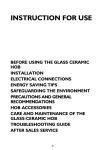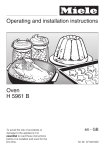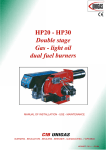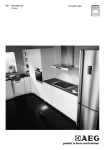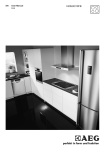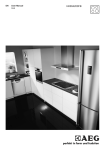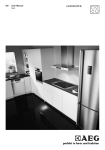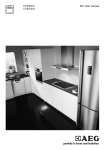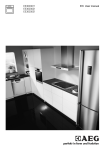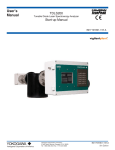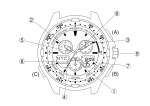Download 47035VD EN User manual
Transcript
47035VD EN User manual 2 www.aeg.com CONTENTS 1. 2. 3. 4. 5. 6. 7. 8. 9. 10. 11. 12. 13. 14. SAFETY INFORMATION . . . . . . . . . . . . . . . . . . . . . . . . . . . . . . . . . . . . . . . . . . . . . . . . . . . . . . 3 SAFETY INSTRUCTIONS . . . . . . . . . . . . . . . . . . . . . . . . . . . . . . . . . . . . . . . . . . . . . . . . . . . . . . 4 PRODUCT DESCRIPTION . . . . . . . . . . . . . . . . . . . . . . . . . . . . . . . . . . . . . . . . . . . . . . . . . . . . . 7 BEFORE FIRST USE . . . . . . . . . . . . . . . . . . . . . . . . . . . . . . . . . . . . . . . . . . . . . . . . . . . . . . . . . . 8 HOB - DAILY USE . . . . . . . . . . . . . . . . . . . . . . . . . . . . . . . . . . . . . . . . . . . . . . . . . . . . . . . . . . . . 9 HOB - HELPFUL HINTS AND TIPS . . . . . . . . . . . . . . . . . . . . . . . . . . . . . . . . . . . . . . . . . . . . . 10 HOB - CARE AND CLEANING . . . . . . . . . . . . . . . . . . . . . . . . . . . . . . . . . . . . . . . . . . . . . . . . 11 OVEN - DAILY USE . . . . . . . . . . . . . . . . . . . . . . . . . . . . . . . . . . . . . . . . . . . . . . . . . . . . . . . . . 11 OVEN - CLOCK FUNCTIONS . . . . . . . . . . . . . . . . . . . . . . . . . . . . . . . . . . . . . . . . . . . . . . . . . 13 OVEN - USING THE ACCESSORIES . . . . . . . . . . . . . . . . . . . . . . . . . . . . . . . . . . . . . . . . . . . 14 OVEN - HELPFUL HINTS AND TIPS . . . . . . . . . . . . . . . . . . . . . . . . . . . . . . . . . . . . . . . . . . . . 16 OVEN - CARE AND CLEANING . . . . . . . . . . . . . . . . . . . . . . . . . . . . . . . . . . . . . . . . . . . . . . . 24 WHAT TO DO IF… . . . . . . . . . . . . . . . . . . . . . . . . . . . . . . . . . . . . . . . . . . . . . . . . . . . . . . . . . 28 INSTALLATION . . . . . . . . . . . . . . . . . . . . . . . . . . . . . . . . . . . . . . . . . . . . . . . . . . . . . . . . . . . . 29 FOR PERFECT RESULTS Thank you for choosing this AEG product. We have created it to give you impeccable performance for many years, with innovative technologies that help make life simpler – features you might not find on ordinary appliances. Please spend a few minutes reading to get the very best from it. Visit our website for: Get usage advice, brochures, trouble shooter, service information: www.aeg.com Register your product for better service: www.aeg.com/productregistration Buy Accessories, Consumables and Original spare parts for your appliance: www.aeg.com/shop CUSTOMER CARE AND SERVICE We recommend the use of original spare parts. When contacting Service, ensure that you have the following data available. The information can be found on the rating plate. Model, PNC, Serial Number. Warning / Caution-Safety information General information and tips Environmental information Subject to change without notice. ENGLISH 3 1. SAFETY INFORMATION Before the installation and use of the appliance, carefully read the supplied instructions. The manufacturer is not responsible if an incorrect installation and use causes injuries and damages. Always keep the instructions with the appliance for future reference. 1.1 Children and vulnerable people safety WARNING! Risk of suffocation, injury or permanent disability. • This appliance can be used by children aged from 8 years and above and persons with reduced physical, sensory or mental capabilities or lack of experience and knowledge if they are supervised by an adult or a person who is responsible for their safety. • Do not let children play with the appliance. • Keep all packaging away from children. • Keep children and pets away from the appliance when it operates or when it cools down. Accessible parts are hot. • If the appliance has a child safety device, we recommend that you activate it. • Cleaning and user maintenance shall not be made by children without supervision. 1.2 General Safety • The appliance and its accessible parts become hot during use. Do not touch the heating elements. • Do not operate the appliance by means of an external timer or separate remote-control system. • Unattended cooking on a hob with fat or oil can be dangerous and may result in fire. 4 www.aeg.com • Never try to extinguish a fire with water, but switch off the appliance and then cover flame e.g. with a lid or a fire blanket. • Do not store items on the cooking surfaces. • Do not use a steam cleaner to clean the appliance. • Metallic objects such as knives, forks, spoons and lids should not be placed on the hob surface since they can get hot. • If the glass ceramic surface is cracked, switch off the appliance to avoid the possibility of electric shock. • Be careful, when you touch the storage drawer. It can get hot. • To remove the shelf supports first pull the front of the shelf support and then the rear end away from the side walls. Install the shelf supports in the opposite sequence. • Do not use harsh abrasive cleaners or sharp metal scrapers to clean the glass door since they can scratch the surface, which may result in shattering of the glass. • Ensure that the appliance is switched off before replacing the lamp to avoid the possibility of electric shock. • The means for disconnection must be incorporated in the fixed wiring in accordance with the wiring rules. • If the supply cord is damaged, it must be replaced by the manufacturer, an authorized Service or similarly qualified persons in order to avoid a hazard. 2. SAFETY INSTRUCTIONS 2.1 Installation WARNING! Only a qualified person must install this appliance. • Remove all the packaging. • Do not install or use a damaged appliance. • Obey the installation instruction supplied with the appliance. ENGLISH • Always be careful when you move the appliance because it is heavy. Always wear safety gloves. • Do not pull the appliance by the handle. • Keep the minimum distance from the other appliances and units. • Make sure that the appliance is installed below and adjacent safe structures. • The sides of the appliance must stay adjacent to appliances or to units with the same height. • Do not install the appliance on a platform. • Do not install the appliance adjacent to a door or under a window. This prevents hot cookware to fall from the appliance when the door or the window is opened. Electrical connection WARNING! Risk of fire and electrical shock. • All electrical connections should be made by a qualified electrician. • The appliance must be earthed. • Make sure that the electrical information on the rating plate agrees with the power supply. If not, contact an electrician. • Always use a correctly installed shockproof socket. • Do not use multi-plug adapters and extension cables. • Make sure not to cause damage to the mains plug and to the mains cable. Contact the Service or an electrician to change a damaged mains cable. • Do not let mains cables to come in touch with the appliance door, specially when the door is hot. • The shock protection of live and insulated parts must be fastened in such a way that it cannot be removed without tools. • Connect the mains plug to the mains socket only at the end of the installation. Make sure that there is access to the mains plug after the installation. • If the mains socket is loose, do not connect the mains plug. 5 • Do not pull the mains cable to disconnect the appliance. Always pull the mains plug. • Use only correct isolation devices: line protecting cut-outs, fuses (screw type fuses removed from the holder), earth leakage trips and contactors. • The electrical installation must have an isolation device which lets you disconnect the appliance from the mains at all poles. The isolation device must have a contact opening width of minimum 3 mm. 2.2 Use WARNING! Risk of injury, burns or electric shock. • Use this appliance in a household environment. • Do not change the specification of this appliance. • Make sure that the ventilation openings are not blocked. • Do not let the appliance stay unattended during operation. • Deactivate the appliance after each use. • Internally the appliance becomes hot when in operation. Do not touch the heating elements that are in the appliance. Always use oven gloves to remove or put in accessories or ovenware. • Be careful, when you open the appliance door while the appliance is in operation. Hot air can release. • Do not operate the appliance with wet hands or when it has contact with water. • Do not apply pressure on the open door. • Do not use an external timer or a separate remote-control system to operate the appliance. • Always keep the appliance door closed when the appliance is in operation. • Do not put cutlery or saucepan lids on the cooking zones. They become hot. • Set the cooking zone to “off” after use. 6 www.aeg.com • Do not use the appliance as a work surface or as a storage surface. • If the surface of the appliance is cracked, disconnect immediately the appliance from the power supply. This to prevent an electrical shock. WARNING! Risk of fire or explosion. • Fats and oil when heated can release flammable vapours. Keep flames or heated objects away from fats and oils when you cook with them. • The vapours that very hot oil releases can cause spontaneous combustion. • Used oil, that can contain food remnants, can cause fire at a lower temperature than oil used for the first time. • Do not put flammable products or items that are wet with flammable products in, near or on the appliance. • Do not let sparks or open flames to come in contact with the appliance when you open the door. • Open the appliance door carefully. The use of ingredients with alcohol can cause a mixture of alcohol and air. • Do not try to extinguish a fire with water. Disconnect the appliance and cover the flame with a lid or a fire blanket. WARNING! Risk of damage to the appliance. • To prevent damage or discoloration to the enamel: – Do not put ovenware or other objects in the appliance directly on the bottom. – Do not put aluminium foil directly on the bottom of the appliance. – do not put water directly into the hot appliance. – do not keep moist dishes and food in the appliance after you finish the cooking. – be careful when you remove or install the accessories. • Discoloration of the enamel has no effect on the performance of the appliance. It is not a defect in the sense of the warranty law. • Use a deep pan for moist cakes. Fruit juices cause stains that can be permanent. • Do not keep hot cookware on the control panel. • Do not let cookware to boil dry. • Be careful not to let objects or cookware fall on the appliance. The surface can be damaged. • Do not activate the cooking zones with empty cookware or without cookware. • Do not put aluminium foil on the appliance. • Cookware made of cast iron, aluminium or with a damaged bottom can cause scratches on the glass ceramic. Always lift these objects up when you have to move them on the cooking surface. WARNING! Make sure to install a stabilizing means in order to prevent tipping of the appliance. Refer to Installation chapter. 2.3 Care and Cleaning WARNING! Risk of injury, fire or damage to the appliance. • Before maintenance, deactivate the appliance and disconnect the mains plug from the mains socket. • Make sure the appliance is cold. There is the risk that the glass panels can break. • Replace immediately the door glass panels when they are damaged. Contact the Service. • Be careful when you remove the door from the appliance. The door is heavy! • Clean regularly the appliance to prevent the deterioration of the surface material. • Remaining fat or food in the appliance can cause fire. • Clean the appliance with a moist soft cloth. Only use neutral detergents. Do not use abrasive products, abrasive cleaning pads, solvents or metal objects. ENGLISH • If you use an oven spray, obey the safety instructions on the packaging. • Do not clean the catalytic enamel (if applicable) with any kind of detergent. 2.4 Internal light • The type of light bulb or halogen lamp used for this appliance, is only for household appliances. Do not use it for house lighting. WARNING! Risk of electrical shock. 2.5 Disposal WARNING! Risk of injury or suffocation. • Disconnect the appliance from the mains supply. • Cut off the mains cable and discard it. • Remove the door catch to prevent children and pets to get closed in the appliance. 2.6 Service • Before replacing the lamp, disconnect the appliance from the power supply. • Only use lamps with the same specifications. • Contact the Service to repair the appliance. We recommend only the use of original spare parts. 3. PRODUCT DESCRIPTION 3.1 General overview 1 Knobs for the hob 1 2 3 4 5 6 1 2 Temperature indicator 3 Knob for the oven temperature 4 Electronic programmer 4 11 1 10 7 8 3 2 7 9 5 Knob for the oven functions 6 Hob control indicator 7 Heating element 8 Oven lamp 9 Fan and heating element 10 Rating plate 11 Shelf positions 8 www.aeg.com 3.2 Cooking surface layout 1 2 140 mm 140 mm 250 mm 1 Cooking zone 1200 W 2 Cooking zone 900 / 2000 W 3 Cooking zone 1200 W 4 Residual heat indicator 120/180 mm 5 140 mm 4 5 Cooking zone 700 / 1700 W 3 3.3 Accessories • Oven shelf For cookware, cake tins, roasts. • Flat baking tray For cakes and biscuits. • Deep roasting pan To bake and roast or as a pan to collect fat. • Removable telescopic runners To put shelves or trays on them. • Storage drawer Below the oven cavity is the storage drawer. 4. BEFORE FIRST USE WARNING! Refer to the Safety chapters. CAUTION! To open the oven door, always hold the handle in the centre. When you connect the appliance to the electrical supply or after a power cut, the indicator for the Time of Day function flashes. Press the + or - button to set the correct time. 4.1 Initial Cleaning • Remove all accessories and removable shelf supports (if applicable). • Clean the appliance before first use. Refer to the chapter "Care and cleaning". 4.2 Setting the time You must set the time before you operate the oven. After approximately five seconds, the flashing stops and the display shows the time of day you set. ENGLISH To change the time, press again and again until the indicator for the Time of Day function flashes. You must not set the Duor End function at ration the same time. 4.3 Preheating Preheat the empty appliance to burn off the remaining grease. 1. Set the function and the maximum temperature. 2. Let the appliance operate for one hour. 9 3. Set the function . The maximum temperature for this function is 210 °C. 4. Let the appliance operate for ten minutes. 5. Set the function and the maximum temperature. 6. Let the appliance operate for ten minutes. Accessories can become hotter than usually. The appliance can emit an odour and smoke. This is normal. Make sure that the airflow is sufficient. 5. HOB - DAILY USE WARNING! Refer to the Safety chapters. 5.2 Using the double zone CAUTION! To activate the double zone, turn the knob clockwise. Do not turn it through the stop position. 5.1 Heat settings Control knob 0 Function Off position Double zone switch 1-9 Turn the knob clockwise to position 9. 2. Turn the knob slowly to the symbol until you can hear a click. The two cooking zones are on. 3. To set the necessary heat setting refer to "Heat settings". 1. Heat settings (1 - lowest heat setting, 9 highest heat setting) 1. Turn the knob to a necessary heat setting. The hob control indicator comes on. 2. To complete the cooking process, turn the knob to the 0position. Use the residual heat to decrease energy consumption. Deactivate the cooking zone approximately 5 - 10 minutes before the cooking process is completed. 5.3 Residual heat indicator The residual heat indicator comes on when a cooking zone is hot. WARNING! There is a risk of burns from residual heat. 10 www.aeg.com 6. HOB - HELPFUL HINTS AND TIPS • Put cookware on a cooking zone before you start it. • Deactivate the cooking zones before the end of the cooking time to use residual heat. • The bottom of pans and cooking zones must have the same dimension. 6.1 Cookware • The bottom of the cookware must be as thick and flat as possible. • Cookware made of enamelled steel and with aluminium or copper bottoms can cause the colour to change on the glassceramic surface. 6.2 Energy saving • If it is possible, always put the lids on the cookware. 6.3 Examples of cooking applications Heat setting Use to: Time (min) 1 Keep cooked food warm. as nec- Put a lid on the cookware. essary 1-2 Hollandaise sauce, melt: butter, 5 - 25 chocolate, gelatine. Mix from time to time. 1-2 Solidify: fluffy omelettes, baked eggs. 10 - 40 Put a lid on the cookware. 2-3 Simmer rice and milkbased dishes, heating up readycooked meals. 25 - 50 Add at least twice as much liquid as rice, mix milk dishes at some point during the procedure. 3-4 Steam vegetables, fish, meat. 20 - 45 Add some tablespoons of liquid. 4-5 Steam potatoes. 20 - 60 Use max. ¼ l water for 750 g of potatoes. 4-5 Cook larger quantities of food, stews and soups. 60 150 Up to 3 l of liquid plus ingredients. 6-7 Gentle frying: escalope, veal as nec- Turn halfway through. cordon bleu, cutlets, rissoles, essary sausages, liver, roux, eggs, pancakes, doughnuts. 7-8 Heavy frying, hash browns, loin steaks, steaks. 9 Boil large quantities of water, cook pasta, sear meat (goulash, pot roast), deep fry chips. The data in the table is for guidance only. 5 - 15 Hints Turn halfway through. ENGLISH 11 7. HOB - CARE AND CLEANING WARNING! Refer to the Safety chapters. Clean the appliance after each use. Always use cookware with clean bottom. Risk of burns from residual heat! Let the appliance cool down. Scratches or dark stains on the glass-ceramic cause no effect on how the appliance operates. To remove the dirt: – Remove immediately: melted plastic, plastic foil and food with sugar. If not, the dirt can cause 1. damage to the appliance. Use a special scraper for the glass. Put the scraper on the glass surface at an acute angle and move the blade across the surface. – Remove after the appliance is sufficiently cool: limescale rings, water rings, fat stains and shiny metallic discolorations. Use a special cleaning agent for glass-ceramic or stainless steel. 2. Clean the appliance with a moist cloth and some detergent. 3. At the end, rub the appliance dry with a clean cloth. 8. OVEN - DAILY USE WARNING! Refer to the Safety chapters. 8.1 Activating and deactivating the appliance 1. Turn the knob for the oven functions to an oven function. The power indicator comes on. 2. Turn the knob for the temperature to a temperature. The temperature indicator comes on while the temperature in the appliance increases. 3. To deactivate the oven, turn the knob for the oven functions and the knob for the temperature to the Off position. 8.2 Safety thermostat The safety thermostat is a thermal cut-out in an operating thermostat. To prevent damage to the oven thermostat caused by dangerous overheating, the oven has a safety thermostat that interrupts the power supply. The oven switches back on again automatically, when the temperature drops. WARNING! The safety thermostat works only if the oven thermostat does not operate correctly. When this occurs, the oven temperature is very high and can burn all the dishes. You must call the Service immediately to replace the oven thermostat. 12 www.aeg.com 8.3 Oven functions Oven function OFF position Oven lamp Conventional cooking Application The appliance is OFF. To illuminate the oven interior without a cooking function. Heats from the top and bottom elements. To bake and roast on one oven level. Bottom heat el- Heats only from the bottom of the oven. To bake ement cakes with crispy or crusty bottoms. Fan forced cooking To cook several different dishes at the same time. To make homemade fruit syrup, and to dry mushrooms or fruit. True fan cooking To roast or roast and bake food with the same cooking temperature on more than one shelf without flavour transference. When you use this function, decrease the oven temperature by 20 - 40 °C from the standard temperatures you use for Conventional cooking. Light cooking Especially for easy food preparation as: meringue, sponge cake, buttered cake, swiss roll. Turbo grilling Pizza function Defrost The grill element and the oven fan operate at different turns and circulate hot air around the food. Also to cook large pieces of meat. WARNING! The maximum temperature for this function is 210 °C. The bottom element provides direct heat to the bases of pizzas, quiches or pies, while the fan circulates air to cook the pizza toppings or pie fillings. To thaw frozen food. The temperature control knob must be on the off position. ENGLISH 13 9. OVEN - CLOCK FUNCTIONS 9.1 Electronic programmer 1 2 1 1 Function indicators 2 Time display 3 Button + 4 Selection button 5 Button - 5 4 3 Clock function Time of day Minute Minder Duration End Application To set, change or check the time of day. To set a countdown time. This function has no effect on the operation of the oven. To set how long the appliance must operate. To set when the appliance must be deactivated. You can use Duration and End at the same time to set the time when the appliance must be activated and then deactivated. First set Duration, then End. 9.2 Setting the clock functions 1. For Duration and End , set an oven function and temperature. This is not necessary for the Minute . Minder 2. Press the Selection button again and again until the indicator for the necessary clock function flashes. 3. Press + or - to set the necessary clock function. The display shows the indicator for the clock function you set. When the set time ends, the indicator flashes and an acoustic signal sounds for two minutes. With the Duration and End functions, the appliance deactivates automatically. 4. Press a button to stop the signal. 14 www.aeg.com 5. Turn the knob for the oven functions and the knob for the temperature to the off position. 2. Press and hold the button -. The clock function goes out after some seconds. 9.3 Cancelling the clock functions 1. Press the Selection button again and again until the necessary function indicator flashes. 10. OVEN - USING THE ACCESSORIES WARNING! Refer to the Safety chapters. 10.1 Inserting the baking tray Put the tray in the centre of the oven cavity, between the front and rear wall. This ensures that the heat can circulate in front of and behind the baking tray. Make sure that the tray is positioned like in the picture, with the angled slope in the rear. WARNING! Do not push the baking tray all the way to the rear wall of the oven cavity. This prevents the heat from circulating around the tray. The food may be burnt, especially in the rear part of the tray. 10.2 Inserting the oven accessories Put in the slide-in accessories so that the double side edges are at the back of the oven and point down to the bottom. Push the slide-in accessories between the guide-bars of one of the oven levels. ENGLISH 15 Inserting the oven shelf and deep roasting pan together Put the oven shelf on the deep roasting pan. Push the deep roasting pan between the guide-bars of one of the oven levels. 10.3 Telescopic runners 1. Pull out the right and left hand telescopic runners. 2. Put the oven shelf on the telescopic runners and carefully push them into the appliance. Make sure you push back the telescopic runners fully in the appliance before you close the oven door. °C °C With telescopic runners you can put and remove the shelves more easily. Keep the installation instructions for the telescopic runners for future use. CAUTION! You can install telescopic runners on different shelf levels, except level 4. CAUTION! Do not clean the telescopic runners in the dishwasher. Do not lubricate the telescopic runners. 16 www.aeg.com 11. OVEN - HELPFUL HINTS AND TIPS CAUTION! Use a deep baking tray for very moist cakes. Fruit juices can cause permanent stains on the enamel. • Do not open the oven door before 3/4 of the set cooking time is up. • If you use two baking trays at the same time, keep one level empty between them. • The appliance has four shelf levels. Count the shelf levels from the bottom of the appliance floor. • You can cook different dishes on two levels at the same time. Place the shelves on level 1 and 3. • Moisture can condense in the appliance or on the glass doors. This is normal. Always stand back form the appliance when you open the appliance door while cooking. To decrease the condensation, run the appliance for 10 minutes before cooking. • Wipe away moisture after every use of the appliance. • Do not put the objects directly on the appliance floor and do not cover the components with aluminium foil when you cook. This can change the baking results and damage the enamel coating. 11.1 Baking cakes • Preheat the oven for approximately 10 minutes before baking. 11.2 Cooking meat and fish • Do not cook meat with weight below 1 kg. Cooking too small quantities makes the meat too dry. • Use a dripping pan for very fatty food to prevent the oven from stains that can be permanent. • Leave the meat for approximately 15 minutes before carving so that the juice does not seep out. • To prevent too much smoke in the oven during roasting, add some water into the dripping pan. To prevent the smoke condensation, add water each time after it dries up. 11.3 Cooking times Cooking times depend on the type of food, its consistency, and volume. Initially, monitor the performance when you cook. Find the best settings (heat setting, cooking time, etc.) for your cookware, recipes and quantities when you use this appliance. 11.4 Conventional cooking Food Tray type and shelf level Preheating time (min) Temperature (°C) Cooking / baking time (min) Pastry stripes (250 g) enamelled tray at level 3 - 150 25 - 30 Flat cake (1000 g) enamelled tray at level 2 10 160 - 170 30 - 35 Yeast cake with apples (2000 g) enamelled tray at level 3 - 170 - 190 40 - 50 Apple pie 2 round aluminized (1200+1200 g) trays (diameter: 20 cm) at level 1 15 180 - 200 50 - 60 Small cakes (500 g) 10 160 - 180 25 - 30 enamelled tray at level 2 ENGLISH 17 Tray type and shelf level Preheating time (min) Temperature (°C) Cooking / baking time (min) Fatless sponge cake (350 g) 1 round aluminized tray (diameter: 26 cm) at level 1 10 160 - 170 25 - 30 Drip pan cake (1500 g) enamelled tray at level 2 - 160 - 170 45 - 55 1) Chicken, oven shelf at level whole (1350 g) 2, baking tray at level 1 - 200 - 220 60 - 70 Chicken, half (1300 g) oven shelf at level 3, baking tray at level 1 - 190 - 210 30 - 35 Pork roast cut- oven shelf at level let (600 g) 3, baking tray at level 1 - 190 - 210 30 - 35 Food Flan bread (800 g) enamelled tray at level 2 20 230 - 250 10 - 15 Stuffed yeast cake (1200 g) enamelled tray at level 2 10 - 15 170 - 180 25 - 35 Pizza (1000 g) enamelled tray at level 2 10 - 15 200 - 220 30 - 40 Cheese cake (2600 g) enamelled tray at level 2 - 170 - 190 60 - 70 Swiss apple flan (1900 g) enamelled tray at level 1 10 - 15 200 - 220 30 - 40 Christmas cake (2400 g) enamelled tray at level 2 10 - 15 170 - 180 55 - 65 2) Quiche Lorraine (1000 g) 1 round tray (diameter: 26 cm) at level 1 10 - 15 220 - 230 40 - 50 18 3) 180 - 200 60 - 70 10 160 - 170 40 - 50 - 160 - 170 30 - 40 10 - 15 200 - 210 10 - 15 Peasant bread 2 round aluminized (750 + 750 g) trays (diameter: 20 cm) at level 1 Romanian sponge cake (600 + 600 g) 2 round aluminized trays (length: 25 cm) at level 2 Romanian 2 round aluminized sponge cake - trays (length: 20 traditional cm) at level 2 (600 + 600 g) Yeast buns (800 g) enamelled tray at level 2 18 www.aeg.com Food Swiss roll (500 g) Tray type and shelf level Preheating time (min) Temperature (°C) Cooking / baking time (min) 10 150 - 170 15 - 20 - 100 - 120 40 - 50 enamelled tray at level 1 Meringue (400 enamelled tray at g) level 2 Crumble cake (1500 g) enamelled tray at level 3 10 - 15 180 - 190 25 - 35 Sponge cake (600 g) enamelled tray at level 3 10 160 - 170 25 - 35 Buttered cake enamelled tray at (600 g) level 2 10 180 - 200 20 - 25 1) After you switch off the appliance, leave the cake in the oven for 7 minutes. 2) After you switch off the appliance, leave the cake in the oven for 10 minutes. 3) Set the temperature to 250 °C for preheating. 11.5 Fan forced cooking Food Tray type and shelf level Preheating time (minutes) Temperature (°C) Cooking / baking time (minutes) Pastry stripes (250 g) enamelled tray at level 3 10 140 - 150 20 - 30 Pastry stripes (250 + 250 g) enamelled tray at level 1 and 3 10 140 - 150 25 - 30 Pastry stripes (250 + 250 + 250 g) enamelled tray at level 1, 2 and 3 10 150 - 160 30 - 40 Flat cake (500 g) enamelled tray at level 2 10 150 - 160 30 - 35 Flat cake (500 + 500 g) enamelled tray at level 1 and 3 10 150 - 160 35 - 45 Flat cake (500 enamelled + 500 + 500 g) tray at level 1, 2 and 4 1) 10 155 - 165 40 - 50 Yeast cake with apples (2000 g) enamelled tray at level 3 - 170 - 180 40 - 50 Apple pie (1200 + 1200 g) 2 round aluminized trays (diameter: 20 cm) at level 2 - 165 - 175 50 - 60 ENGLISH 19 Tray type and shelf level Preheating time (minutes) Temperature (°C) Cooking / baking time (minutes) Small cakes (500 g) enamelled tray at level 2 10 150 - 160 20 - 30 Small cakes (500 + 500 g) enamelled tray at level 1 and 3 10 150 - 160 30 - 40 Small cakes (500 + 500 + 500 g) enamelled tray at level 1, 2 and 4 1) 10 150 - 160 35 - 45 Fatless sponge cake (350 g) 1 round aluminized tray (diameter: 26 cm) at level 1 10 150 - 160 20 - 30 Drip pan cake (1200 g) enamelled tray at level 2 - 150 - 160 30 - 35 2) Chicken, oven shelf at whole (1300 g) level 2, baking tray at level 1 - 170 - 180 40 - 50 Pork roast (800 g) oven shelf at level 2, baking tray at level 1 - 170 - 180 45 - 50 Stuffed yeast cake (1200 g) enamelled tray at level 2 20 - 30 150 - 160 20 - 30 Pizza (1000 + 1000 g) enamelled tray at level 1 and 3 - 180 - 200 30 - 40 Pizza (1000 g) enamelled tray at level 2 - 190 - 200 25 - 35 Cheese cake (2600 g) enamelled tray at level 1 - 160 - 170 40 - 50 Swiss apple flan (1900 g) enamelled tray at level 2 10 - 15 180 - 200 30 - 40 Christmas cake (2400 g) enamelled tray at level 2 10 150 - 160 35 - 40 2) Quiche Lorraine (1000 g) 1 round tray (diameter: 26 cm) at level 2 10 - 15 190 - 210 30 - 40 15 - 20 3) 160 - 170 40 - 50 Food Peasant bread 2 round alu(750 + 750 g) minized trays (diameter: 20 cm) at level 1 20 www.aeg.com Tray type and shelf level Preheating time (minutes) Temperature (°C) Cooking / baking time (minutes) Romanian sponge cake (600 + 600 g) 2 round aluminized trays (diameter: 25 cm) at level 2 10 - 15 155 - 165 40 - 50 Romanian sponge cake traditional (600 + 600 g) 2 round aluminized trays (diameter: 20 cm) at level 2 - 150 - 160 30 - 40 Yeast buns (800 g) enamelled tray at level 3 15 180 - 200 10 - 15 Yeast buns (800 + 800 g) enamelled tray at level 1 and 3 15 180 - 200 15 - 20 Swiss roll (500 g) enamelled tray at level 3 10 150 - 160 15 - 25 Meringue (400 enamelled g) tray at level 2 - 110 - 120 30 - 40 Meringue (400 enamelled + 400 g) tray at level 1 and 3 - 110 - 120 45 - 55 Meringue (400 enamelled + 400 + 400 g) tray at level 1, 2 and 4 1) - 115 - 125 55 - 65 Crumble cake (1500 g) enamelled tray at level 3 - 160 - 170 25 - 35 Sponge cake (600 g) enamelled tray at level 2 10 150 - 160 25 - 35 Buttered cake enamelled (600 + 600 g) tray at level 1 and 3 10 160 - 170 25 - 35 Food 1) After the cake at level 4 is done, take it out and put in the cake from level 1. Bake for ten more minutes. 2) After you switch off the appliance, leave the cake in the oven for 7 minutes. 3) Set the temperature to 250 °C for preheating. 11.6 Fan cooking Food Tray type and shelf level Pastry stripes (250 g) enamelled tray at level 3 Preheating time (minutes) Temperature (°C) Cooking / baking time (minutes) 10 150 - 160 20 - 30 ENGLISH 21 Preheating time (minutes) Temperature (°C) Cooking / baking time (minutes) enamelled tray at level 1 and 3 10 140 - 150 25 - 30 Pastry stripes (250 + 250 + 250 g) enamelled tray at level 1, 2 and 4 10 150 - 160 30 - 35 Flat cake (1000 g) enamelled tray at level 2 10 150 - 160 30 - 40 Flat cake (1000 + 1000 g) enamelled tray at level 1 and 3 10 140 - 150 45 - 55 Flat cake (1000 + 1000 + 1000 g) enamelled tray at level 1, 2 and 4 10 140 - 150 55 - 65 Yeast cake with apples (2000 g) enamelled tray at level 3 10 170 - 180 40 - 50 Apple pie (1200 + 1200 g) 2 round aluminized trays (diameter: 20 cm) at level 2 and 3 10 170 - 180 50 - 60 Small cakes (500 g) enamelled tray at level 3 10 140 - 150 30 - 35 Small cakes (500 + 500 g) enamelled tray at level 1 and 3 10 140 - 150 25 - 30 Small cakes (500 + 500 + 500 g) enamelled tray at level 1, 2 and 4 10 150 - 160 25 - 30 Fatless sponge cake (350 g) 1 round aluminized tray (diameter: 26 cm) at level 3 10 150 - 160 30 - 40 Drip pan cake (1200 g) enamelled tray at level 3 - 150 - 160 40 - 50 1) Chicken, whole (1400 g) oven shelf at level 2, baking tray at level 1 - 170 - 190 50 - 60 Pork roast cutlet (600 g) oven shelf at level 3, baking tray at level 1 - 180 - 200 30 - 40 Flan bread (800 g) enamelled tray at level 2 15 230 - 250 10 - 15 Stuffed yeast cake (1200 g) enamelled tray at level 3 20 - 30 160 - 170 20 - 30 Pizza (1000 + 1000 g) enamelled tray at level 1 and 3 - 180 - 200 50 - 60 Food Tray type and shelf level Pastry stripes (250 + 250 g) 22 www.aeg.com Preheating time (minutes) Temperature (°C) Cooking / baking time (minutes) enamelled tray at level 2 - 150 - 170 60 - 70 Swiss apple flan (1900 g) enamelled tray at level 3 15 180 - 200 30 - 40 Christmas cake (2400 g) enamelled tray at level 3 10 150 - 170 50 - 60 2) 15 210 - 230 35 - 45 Food Tray type and shelf level Cheese cake (2600 g) Quiche Lor1 round tray (diameraine (1000 g) ter: 26 cm) at level 2 Peasant bread (750 + 750 g) 2 round aluminized trays (diameter: 20 cm) at level 3 15 3) 180 - 190 50 - 60 Romanian sponge cake (600 + 600 g) 2 round aluminized trays (diameter: 25 cm) at level 2 10 150 - 170 40 - 50 Romanian sponge cake - traditional (600 + 600 g) 2 round aluminized trays (diameter: 20 cm) at level 2 - 160 - 170 30 - 40 Yeast buns (800 g) enamelled tray at level 3 10 180 - 200 10 - 15 Yeast buns (800 + 800 g) enamelled tray at level 1 and 3 10 180 - 200 15 - 20 Swiss roll (500 enamelled tray at levg) el 3 10 150 - 170 10 - 15 Meringue (400 g) enamelled tray at level 2 - 100 - 120 50 - 60 Meringue (400 + 400 g) enamelled tray at level 1 and 3 - 100 - 120 55 - 65 Meringue (400 + 400 + 400 g) enamelled tray at level 1, 2 and 4 - 115 - 125 65 - 75 Crumble cake (1500 g) enamelled tray at level 2 10 170 - 180 20 - 30 Sponge cake (600 g) enamelled tray at level 2 10 150 - 170 20 - 30 Buttered cake (600 + 600 g) enamelled tray at level 1 and 3 10 150 - 170 20 - 30 1) After you switch off the appliance, leave the cake in the oven for 7 minutes. 2) After you switch off the appliance, leave the cake in the oven for 10 minutes. 3) Set the temperature to 230 °C for preheating. ENGLISH 23 11.7 Light cooking Food Tray type and shelf level Preheating time (minutes) Temperature (°C) Cooking / baking time (minutes) Pastry stripes (250 g) enamelled tray at level 2 20 1) 150 - 160 20 - 25 Flat cake (500 g) enamelled tray at level 2 20 1) 160 - 170 35 - 40 Pizza (1000 g) enamelled tray at level 2 20 1) 200 - 210 30 - 40 Swiss roll (500 g) enamelled tray at level 2 20 1) 160 - 170 20 - 30 Meringue (400 g) enamelled tray at level 2 10 1) 110 - 120 50 - 60 Sponge cake (600 g) enamelled tray at level 2 20 1) 160 - 170 25 - 30 Buttered cake (600 g) enamelled tray at level 2 20 1) 160 - 170 25 - 30 Chicken, whole (1200 g) oven shelf at level 2 2) - 220 - 230 45 - 55 1) Set the knob for the temperature to 250 °C. 2) Put a baking tray under the oven shelf, on the shelf level 1. 11.8 Turbo grilling Shelf level Preheating time (minutes) Temperature (°C) Cooking / baking time (minutes) Toast (500 g) 3 10 230 3-5 Chicken, half (1200 g) 2 - 200 25 + 25 Pork roast cutlet (500 g) 2 - 230 20 + 20 Food 24 www.aeg.com 11.9 Pizza setting Food Tray type and shelf level Preheating time (minutes) Temperature (°C) Cooking / baking time (minutes) Apple pie (1200 + 1200 g) 2 round aluminized trays (diameter: 20 cm) at level 2 - 170 - 180 50 - 60 Chicken, whole (1400 g) level 2 - 165 - 175 55 - 65 Chicken, half (1350 g) level 2 - 165 - 175 30 - 35 Pizza (1000 + 1000 g) enamelled or aluminized tray at level 1 and 2 1) - 180 - 200 30 Pizza (1000 g) enamelled tray at level 2 - 190 - 200 25 - 35 Quiche Lorraine (1000 g) level 2 10 - 15 210 - 220 20 - 30 1) After 20 minutes, switch the trays between the levels. 12. OVEN - CARE AND CLEANING WARNING! Refer to the Safety chapters. • Clean the front of the appliance with a soft cloth with warm water and cleaning agent. • To clean metal surfaces use a usual cleaning agent • Clean the oven interior after each use. Thus you can remove dirt more easily and it does not burn on. • Clean stubborn dirt with a special oven cleaner. • Clean all oven accessories (with a soft cloth with warm water and cleaning agent) after each use and let them dry. • If you have nonstick accessories, do not clean them using an aggressive agents, sharp edged objects or dishwasher. It can destroy nonstick coating! ENGLISH 25 12.1 Shelf support You can remove the shelf support to clean the side walls. 1 2 Installing the shelf support Install the shelf support in the sequence opposite to its removal. 12.2 Oven ceiling You can remove the grill to clean the oven ceiling more easily. WARNING! Deactivate the appliance before you remove the grill. Make sure that the appliance is cold. There is a risk of burns. 1. Remove the screw which holds the grill. For the first time, use a screwdriver. Removing the shelf support 1. Pull the front of the shelf support away from the side wall. 2. Pull out the shelf support from the back of the side wall and remove it. 4. Install the grill in the opposite sequence. WARNING! Make sure that the grill is correctly installed and that it does not fall down. 12.3 Cleaning the oven door The oven door has two panels of glass installed one behind the other. To make the cleaning easier remove the oven door. WARNING! The oven door can close if you try to remove the internal panel of glass when the door is still assembled. WARNING! Make sure that the glass panels are cool, before you clean the glass door. There is risk that the glass breaks. 2. 3. Carefully pull the grill down. Clean the oven ceiling with a soft cloth with warm water and a cleaning agent, and let it dry. WARNING! When the door glass panels are damaged or have scratches, the glass becomes weak and can break. To prevent this you must replace them. For more instructions, contact your local Service Centre. 26 www.aeg.com Removing the oven door and the glass panel 1. Open the door fully and hold the two door hinges. 2. Lift and turn the levers on the two hinges. 3. Close the oven door to the first opening position (halfway). Then pull forward and remove it from its seat. ENGLISH 4. 27 Place the door on a stable surface protected by a soft cloth. Use a screwdriver to remove 2 screws from bottom edge of door. Do not lose the screws. 1 1 5. 3 2 2 6. 7. Use a spatula made of wood or plastic or equivalent to open the inner door. Hold the outer door, and push the inner door against the top edge of the door. Lift the inner door. Clean inner side of the door. Clean the glass panel with water and soap. Dry it carefully. WARNING! Only clean the glass panel with water and a soap. Abrasive cleaning agents, stain removers and sharp objects (e.g. knives or scrapers) can cause damage to the glass. Inserting the door and the glass panel When the cleaning procedure is completed, insert the oven door. To do so, do the steps in opposite way. 4 4 6 5 5 12.4 Removing the drawer The drawer below the oven can be removed for cleaning. 1. Pull the drawer out until it stops. 28 www.aeg.com WARNING! Bulb lamps used in this appliance are special lamps for use only in household appliances. Do not use them to illuminate household rooms or parts of rooms. If you need to replace a lamp, the replacement lamp must have the same power and be for use only in household appliances. 2. Lift the drawer at a small angle and remove it from the drawer support rails. Inserting the drawer Set the drawer on the support rails. Make sure that the catches engage correctly into the rails. 2. Lower the drawer until it is horizontal and push it in. 1. WARNING! When the oven is in use, heat can build up in the drawer. Do not keep flammable things in there (e.g. cleaning materials, plastic bags, oven gloves, paper, cleaning sprays, etc.). 12.5 Oven lamp Before you change the oven lamp: • Deactivate the appliance. • Remove the fuses in the fuse box or deactivate the circuit breaker. • Put a cloth on the bottom of the oven. This prevents from damage to the oven light and glass cover. Replacing the oven lamp: Find the lamp glass cover at the back of the cavity. Turn the lamp glass cover counterclockwise to remove it. 2. Clean the glass cover. 3. Replace the oven lamp with an applicable 300 °C heat-resistant oven lamp. Use only the same oven lamp type as the replacement lamp. It must have the same power and be for use only in household appliances. 4. Install the glass cover. 1. WARNING! Be careful when you change the oven lamp. Always switch off the appliance before you start to replace the lamp. There is a risk of electric shock. 13. WHAT TO DO IF… Problem Possible cause Remedy The oven does not heat up. The oven is not activated. Activate the oven. The oven does not heat up. The clock is not set. Set the clock. The oven does not heat up. The necessary settings are not set. Control the settings. ENGLISH Problem 29 Possible cause Remedy The oven does not heat up. The fuse in the fuse box is released. Control the fuse. If the fuse is released more than one time, refer to a qualified electrician. The oven lamp does not operate. The oven lamp is defective. Replace the oven lamp. Steam and condensation You left the dish in the collect on the food and oven for too long. in the oven. Do not keep the dishes in the oven for longer than 15-20 minutes after the cooking ends. The display shows "12.00" and "LED". There was a power cut. Set the clock. The residual heat indicator does not come on. The cooking zone is not hot because it operated only for a short time. If the cooking zone operated sufficiently long to be hot, speak to the Service Centre. If you cannot find a solution to the problem yourself, contact your dealer or the service centre. The necessary data for the service centre is on the rating plate. The rating plate is on the front frame of the oven cavity. We recommend that you write the data here: Model (MOD.) ......................................... Product number (PNC) ......................................... Serial number (S.N.) ......................................... 14. INSTALLATION WARNING! Refer to the Safety chapters. 14.1 Location of the appliance You can install your freestanding appliance with cabinets on one or two sides and in the corner. A B 30 www.aeg.com Minimum distances Voltage 230 V 50 Hz Dimension mm Frequency A 690 14.3 Levelling B 150 14.2 Technical Data Use small feet on the bottom of appliance to set the appliance top surface level with other surfaces. Dimensions Height 858 mm Width 500 mm Depth 600 mm Total electricity power 9135 W 14.4 Anti-tilt protection WARNING! You must install the anti-tilt protection. Install the anti-tilt protection to prevent the appliance to fall with incorrect loads. WARNING! Your appliance has the symbol shown on the picture (if applicable) to remind you about the installation of the anti-tilt protection. Make sure you install the anti-tilt protection at the correct height. ENGLISH 80-85 mm 317322 mm 31 How to install the anti-tilt protection 1. Set the correct height and area for the appliance before you attach the anti-tilt protection. 2. Make sure that the surface behind the appliance is smooth. 3. Install the anti-tilt protection 317 322 mm down from the top surface of the appliance and 80 - 85 mm from the side of the appliance into the circular hole on a bracket. Screw it into the solid material or use applicable reinforcement (wall). 4. You can find the hole on the left side at the back of the appliance. See the illustration. 5. If you changed the dimensions of the cooker, you must align the nontip device correctly. If the space between the bench cupboards is larger than the width of the appliance, you must adjust the side measurement to center the appliance. 14.5 Electrical installation The manufacturer is not responsible if you do not follow safety precautions from the chapter "Safety information". This appliance is supplied without a main plug and a main cable. Applicable cable type: H05 RR-F with adequate cross-section. WARNING! Before you connect the mains cable to the terminal, measure the voltage between phases in the house network. Then, refer to the connection label at the back of the appliance to use the correct electrical installation This order of steps prevents from installation errors and damage to the electrical components of the appliance. The power cable must not touch the part of the appliance shown in the illustration. 32 www.aeg.com 15. ENVIRONMENT CONCERNS Recycle the materials with the symbol . Put the packaging in applicable containers to recycle it. Help protect the environment and human health and to recycle waste of electrical and electronic appliances. Do not dispose appliances marked with the symbol with the household waste. Return the product to your local recycling facility or contact your municipal office. ENGLISH 33 34 www.aeg.com ENGLISH 35 892953780-B-272013 www.aeg.com/shop




































